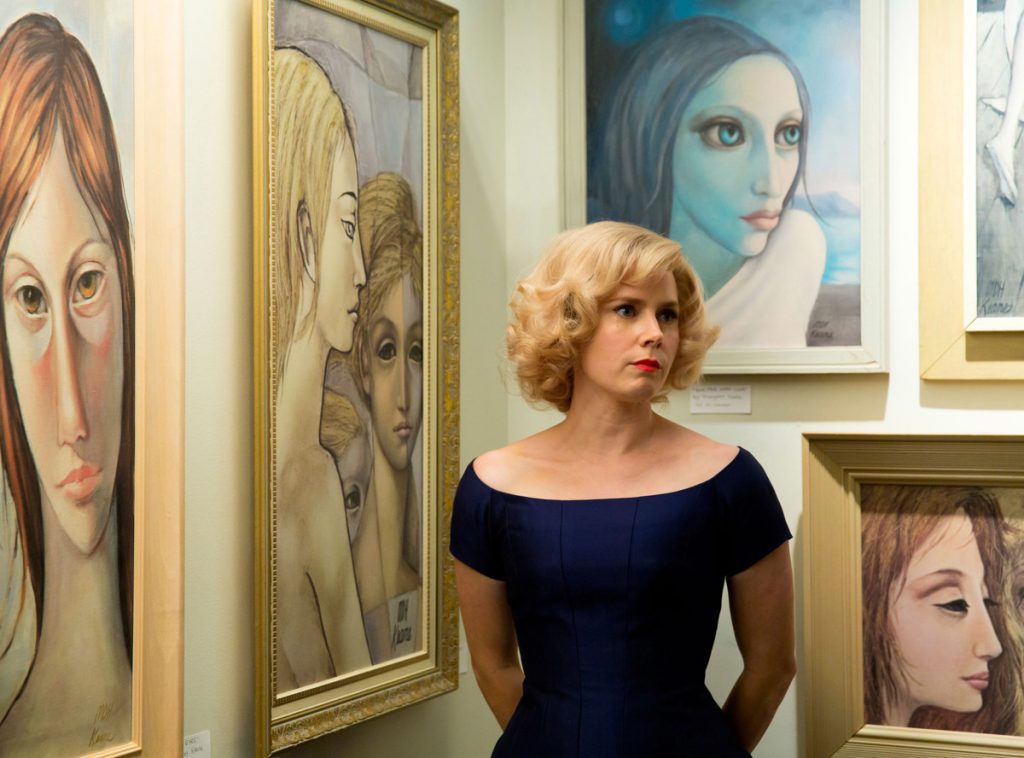Big Eyes (2014)

Tim Burton (Dark Shadows, Alice in Wonderland) surely must have heard many of his casting choices in films over the years, with a plethora of young actresses with pasty skin and big eyes, as reminiscent of Keane paintings. Naturally, he would be the kind of filmmaker who might be ‘keen’ on Keane, so it’s no surprise to see him bring to light the painter that best embodies his visual sensibilities. Burton himself has also had a similar struggle as Keane in trying to establish respectability as an artist instead of being an entertaining director of kitsch, though anyone who has been able produce films as sublime as Ed Wood and Big Fish should surely earn some respect as more than just a guy with an eye for a surreal menagerie of circus-like visuals.
Given that Ed Wood‘s screenwriters are back on board with Big Eyes, it would seem like the kind of movie that would put Burton back in the forefront of creative filmmakers again. Alas, it’s another mixed bag. What starts off with the promise of an interesting story to come manages to catch a hook, then proceeds to take artistic liberties that ring false notes of increasing intensity, until an overreaching third act involving an altercation with an art critic and a prolonged court case that feels like Burton is laboring to come up with a hilarious and pithy finale, which dilly-dallies in comical absurdity on its way to the kind of ending everyone is expecting from the get-go.
The hook of this story, based on true events from the late 1950s through 1960s, is that the wildly popular artist known as Walter Keane (Waltz, The Zero Theorem) was no artist at all, merely a salesman, pitching his shy wife Margaret’s (Adams, American Hustle) paintings as his own. This symbiotic relationship served the couple well, as she had the talent and he had the know-how to market them, until millions around the world had come to see, if not own, a replica of her most famous of paintings on their postcards, posters, key chains, or a variety of other merchandised products found in their local stores. Margaret struggles with her conscience, having to lie to everyone, including her own daughter, about the authorship of her own paintings, as well as sacrificing having friends or any semblance of a life beyond continuing to produce work her husband is all too eager to take credit for.
Perhaps the most interesting aspect of Big Eyes is the notion that, for all of Walter Keane’s despicable glory-hogging ways of self-promotion in getting his wife’s paintings out to the public, Margaret Keane might have continued to languish in obscurity and poverty without him. Burton manages to dabble with that conflicted dichotomy of an artist wanting the world to admire her work but whose work would never get out there were it not for the manipulative huckster she married being able to wheel and deal, even if it means she has to stand in perpetual shadows indefinitely.
Life imitates art, as Tim Burton’s artistic flourishes come off as Margaret’s, populist kitsch that lacks the passion that would suggest authentic artistic expression yearning to break out. It strains for credibility, but instead goes all too often to a proverbial bag of narrative tricks in order to try to contort entertainment out of a story that could have used more subtlety and grit instead of gloss, contrivance, and sitcom-worthy attempts to color everything with an eye to entertain more than inform or inspire. A subdued Adams and hammy Waltz give their performances their all, but there’s not much going on inside these personalities to give us any glimpse beyond the superficial story elements on just what’s motivating them. In other words, Burton can’t make a masterpiece in Big Eyes since he’s chosen to paint his characters and their situations with the broadest brush possible.
Qwipster’s rating: C
MPAA Rated: PG-13 for thematic elements and brief strong language
Running Time: 105 min.
Cast: Amy Adams, Christoph Waltz, Krysten Ritter, Delaney Raye, Danny Huston, Jason Schwartzman, Terence Stamp, Madeleine Arthur, James Salto, Jon Polito
Director: Tim Burton
Screenplay: Scott Alexander, Larry Karaszewski
